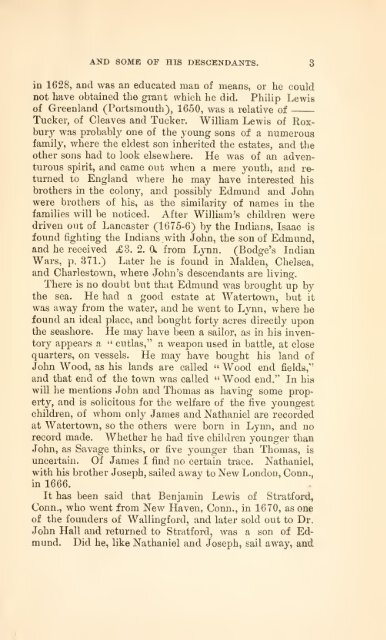Edmund Lewis, of Lynn, Massachusetts, and some of his descendants
Edmund Lewis, of Lynn, Massachusetts, and some of his descendants
Edmund Lewis, of Lynn, Massachusetts, and some of his descendants
You also want an ePaper? Increase the reach of your titles
YUMPU automatically turns print PDFs into web optimized ePapers that Google loves.
AND SOME OF HIS DESCENDANTS. 3<br />
in 1628, <strong>and</strong> was an educated man <strong>of</strong> means, or he could<br />
not have obtained the grant which he did. Philip <strong>Lewis</strong><br />
<strong>of</strong> Greenl<strong>and</strong> (Portsmouth), 1650, was a relative <strong>of</strong><br />
Tucker, <strong>of</strong> Cleaves <strong>and</strong> Tucker. William <strong>Lewis</strong> <strong>of</strong> Roxbury<br />
was probably one <strong>of</strong> the young sons <strong>of</strong> a numerous<br />
family, where the eldest son inherited the estates, <strong>and</strong> the<br />
other sons had to look elsewhere. He was <strong>of</strong> an adventurous<br />
spirit, <strong>and</strong> came out when a mere youth, <strong>and</strong> returned<br />
to Engl<strong>and</strong> where he may have interested <strong>his</strong><br />
brothers in the colony, <strong>and</strong> possibly <strong>Edmund</strong> <strong>and</strong> John<br />
were brothers <strong>of</strong> <strong>his</strong>, as the similarity <strong>of</strong> names in the<br />
families will be noticed. After William's children were<br />
driven out <strong>of</strong> Lancaster (1675-6) by the Indians, Isaac is<br />
found fighting the Indians with John, the son <strong>of</strong> <strong>Edmund</strong>,<br />
<strong>and</strong> he received £3. 2. (X from <strong>Lynn</strong>. (Bodge's Indian<br />
Wars, p. 371.) Later he is found in Maiden, Chelsea,<br />
<strong>and</strong> Charlestown, where John's <strong>descendants</strong> are living.<br />
There is no doubt but that <strong>Edmund</strong> was brought up by<br />
the sea. He had a good estate at Watertown, but it<br />
was away from the water, <strong>and</strong> he went to <strong>Lynn</strong>, where he<br />
found an ideal place, <strong>and</strong> bought forty acres directly upon<br />
the seashore. He may have been a sailor, as in <strong>his</strong> inventory<br />
appears a " cutlas," a weapon used in battle, at close<br />
quarters, on vessels. He may have bought <strong>his</strong> l<strong>and</strong> <strong>of</strong><br />
John Wood, as <strong>his</strong> l<strong>and</strong>s are called " Wood end fields,"<br />
<strong>and</strong> that end <strong>of</strong> the town was called " Wood end." In <strong>his</strong><br />
will he mentions John <strong>and</strong> Thomas as having <strong>some</strong> property,<br />
<strong>and</strong> is solicitous for the welfare <strong>of</strong> the five youngest<br />
children, <strong>of</strong> whom only James <strong>and</strong> Nathaniel are recorded<br />
at Watertown, so the others were born in <strong>Lynn</strong>, <strong>and</strong> no<br />
record made. Whether he had live children younger than<br />
John, as Savage thinks, or five younger than Thomas, is<br />
uncertain. Of James I find no certain trace. Nathaniel,<br />
with <strong>his</strong> brother Joseph, sailed away to New London, Conn.,<br />
in 1666.<br />
It has been said that Benjamin <strong>Lewis</strong> <strong>of</strong> Stratford,<br />
Conn., who went from New Haven, Conn., in 1670, as one<br />
<strong>of</strong> the founders <strong>of</strong> Wallingford, <strong>and</strong> later sold out to Dr.<br />
John Hall <strong>and</strong> returned to Stratford, was a son <strong>of</strong> <strong>Edmund</strong>.<br />
Did he, like Nathaniel <strong>and</strong> Joseph, sail away, <strong>and</strong>

















